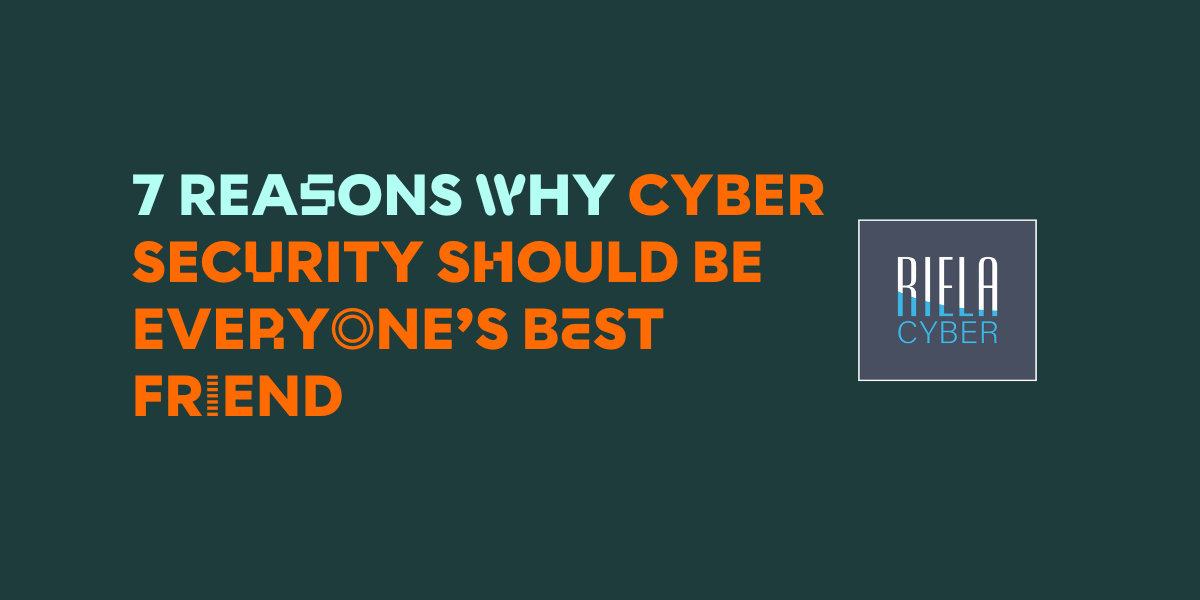7 REASONS WHY CYBER SECURITY SHOULD BE EVERYONE'S BEST FRIENDS
13 November 2024

Let’s face it: running a business today means navigating a vast number of challenges, let alone keeping on top of the cyber threats that could harm your business.
But here is the good news - taking control of cyber security doesn’t have to be daunting. In fact, with the right practices and a little planning, cyber security can become a trusted ally in protecting your business, regardless of its the size or sector. As digital transformation becomes a top priority for any business, it’s clear that IT risks are critical business risks. Most business owners aren’t cyber security experts and don’t have time to stay on top of cyber risks so here’s a quick dive into why cyber security is essential and how it can help keep your business safe, secure, and thriving: -
1. Cyber Threats: They’re Not Just for Big Companies
Many people assume that cyber criminals only go after “big fish,” but in reality, small and medium-sized businesses are often prime targets. Hackers know these businesses may have weaker defences, making them easier to exploit. Common cyber threats include:
- Phishing Attacks: Tricky emails that look legit but are trying to get your data for malicious use, including intercepting payments.
- Ransomware: Nasty software that locks you out of your data until you pay.
- Data Breaches: When hackers sneak in and steal sensitive information and then make you pay to get it back.
No business is immune but following some cyber security basics can still prevent up to 98% of attacks and keep your company’s doors closed to digital troublemakers.
2. Stay on the Right Side of Regulations (and Fines!)
No one likes dealing with fines and legal headaches. Many industries, like healthcare and finance, have regulations requiring companies to protect data. Whether it’s GDPR in Europe or the Data Protection Act in the Isle of Man, failing to meet these requirements can lead to expensive fines. Following best practice helps prevent breaches, keeps your data safe, and keeps you out of hot water with regulators. Many cyber security incidents involve sensitive personal identifiable information (PII) and must be reported to the ICO.
3. Cyber Incidents Are Expensive (and Avoidable)
A single cyberattack can cost a business hundreds of thousands or even millions. These costs include everything from lost revenue to legal fees to the expense of fixing systems or even reputational damage. The financial hit from a data breach or ransomware attack can devastate small businesses. But it’s not just about the upfront costs—losing valuable data or your customers’ trust can affect your company for years.
4. Customers Expect You to Keep Their Data Safe
Imagine if your law firm or corporate service provider got hacked and your entire transaction history and agreements are leaked to the public - you’d likely think twice about using them again. Your customers feel the same. People want the confidence that their data is safe in your hands. A solid cyber security approach helps protect your reputation and keeps your customer’s trust intact.
5. Being Cyber-Savvy Sets You Apart
Standing out in a competitive market is challenging but showing that you take cyber security seriously can give you an edge. When customers see that you prioritise their data security, it builds an extra layer of trust. A cyber-oriented culture can even be a key selling point, particularly for clients in industries where data is sensitive, and protection is crucial.
6. Basic Cyber security Steps Every Business Should Take
You don’t have to spend a lot or go overboard to stop most attacks. These simple steps can go a long way, are easy to implement, protect your data as well as your business:
- Regular Risk Checks: Identify and fix weak points before they become a problem.
- Employee Training: Teach your team to spot phishing attempts and to use strong passwords. Research suggests that awareness following training wears off after a few months so continuous or regular training will keep your team on top of cyber threats.
- Firewalls and MDR Software: Your first line of defence against malware. Configure firewalls securely to stop any malicious traffic from entering your systems, they are your perimeter wall to protect your castle. Managed Detection and Response software is an advanced and cost-effective tool that monitors activities on your devices to make sure any malicious activities are detected and stopped as soon as possible.
- Access Controls: Keep sensitive data restricted to those who need it. Not everyone in your business needs to have access to everything. Make sure data is segregated on a least privilege basis so that if there is an incident, not everything is compromised. Nobody should have admin accounts if they don’t need them.
- Backups and Incident Response Plan: Have a game plan ready if something goes wrong. Your ultimate insurance is a robust backup process which will allow you to recover in case hackers gain access to your data. Consider various scenarios and test your incident response plan regularly to make sure everything works as intended.
7. Cost of Basic Cyber Security Hygiene
Basic cyber hygiene measures for an SME with 20 staff typically include:
- Advanced Security Configurations: Implementation costs are often minimal, approximately £200 for training and software, or free through a pro-active Managed IT Service provider.
- Cloud Air-gapped Backups: Costs about £20 monthly for 100 GB (£240 p.a.) for a small business (£0.20 per GB).
- Email Security: £4 per user per month or £960 per year to keep malicious emails out of your staff email inboxes – the less spam they receive, the less risk anyone clicks on a malicious link that compromises the business.
- MDR Software: estimated cost around £3,600 annually (typically £15 per user per month, fully managed and monitored 24/7).
- Firewall: Initial setup and maintenance are often included with a good Managed IT Service provider. Intrusion prevention and detection cost around £1,000 per year.
Total Estimated Cost
The total annual cost for implementing these basic measures might be around £500 per month or £6,000 p.a. for an SME. Looking at it differently, that’s only £25 per user per month to keep your business secure from up to 98% of attacks!
Potential Costs of a Cyber Incident
According to recent statistics, the average cost of a single cyber incident for businesses can range from £15,000 to over £3.5 million, depending on the incident and size of the business. For SMEs specifically, this cost can vary significantly based on the severity and type of breach.
Breakdown of Costs:
Direct Costs:
- Recovery and remediation efforts.
- Potential ransom payments.
- Legal fees and fines.
Indirect Costs:
- Loss of customer trust leading to reduced sales.
- Downtime resulting in lost productivity.
- Long-term reputational damage.
- Loss productivity due to remediation efforts by the team.
Average Estimated Cost
The average total cost of even a basic breach can easily exceed £15,000, with some estimates indicating that smaller businesses could face direct costs as high as £30,000. Indirect costs are harder to estimate and can have an even more devastating impact on a smaller business.
ROI Calculation
To calculate the ROI for even a basic incident, we can use the formula:
ROI = Net Profit / Cost of Investment * 100
Where?
- Net Profit = Savings from avoiding a breach - Cost of implementing security measures.
Assuming an SME avoids one significant breach due to these hygiene measures:
Net Profit = £15,000 (cost avoided) - £6,000 (cost of measures) = £9,000.
Calculating ROI:
ROI = £9,000 / £6,000 = 150%
Conclusion
Investing in basic cyber security hygiene should be affordable for any business and can yield a substantial ROI for SMEs. At a cost of £25 per user per month on basic security measures, businesses can avoid up to 98% of potentially crippling cyber-attacks and avoid incidents which each can cost up to £15,000.
Final Thoughts
Think of cyber security as your digital security guard: it safeguards your assets, protects your reputation, and provides peace of mind. A small investment in time and effort now can prevent much larger issues down the road.
This article has been created by a third party and is provided for general informational purposes only and does not constitute endorsement, recommendation, or approval by Digital Isle of Man.
While we strive to ensure the accuracy, relevance, and reliability of third-party content, we do not warrant or guarantee its completeness, timeliness, or fitness for any particular purpose. Any reliance you place on such content is strictly at your own risk.





